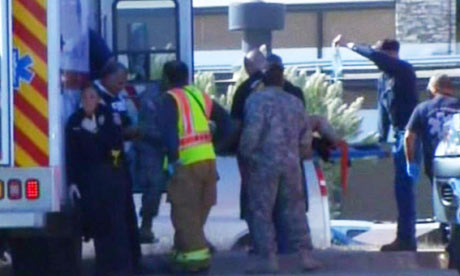
Medics put a injured person into an ambulance after shootings at Fort Hood, Texas, where the alleged shooter Major Nidal Malik Hasan is now in police custody. Photograph: AP
After an American soldier's tragic outburst of violence at Fort Hood, Texas – the army's largest US post, with some 40,000 troops – dominates the headlines, a fear-mongering hysteria concerning his supposed religious motivations is taking priority over questions regarding his mental health.

After an American soldier's tragic outburst of violence at Fort Hood, Texas – the army's largest US post, with some 40,000 troops – dominates the headlines, a fear-mongering hysteria concerning his supposed religious motivations is taking priority over questions regarding his mental health.

Although the facts, and clues about motive, are still being uncovered, we know that the alleged shooter, 39-year-old Major Nidal Malik Hasan, is an American-born medical doctor and licensed psychiatrist, who also happens to be a Muslim born to Palestinian immigrant parents.
When Hasan's Arabic name was revealed as the alleged shooter, the blogosphere and message boards lit up with the predictable assortment of anonymous bigoted bile vilifying Islam and questioning the loyalty of American Muslims.
Thankfully, most mainstream voices, such as Republican senator John Cornyn of Texas, urged caution and moderation, stating: "It is imperative that we take the time to gather all the facts, as it would be irresponsible to be the source of rumours or inaccurate information regarding such a horrific event."
But some, such as Republican US representative Michael McCaul of Austin, Texas, alarmingly responded with inflammatory histrionics: "Whether it was domestic or foreign, clearly when a US military base is attacked in this fashion, that is an act of terror in my book."
If it is discovered that this lethal rampage was motivated by an inexcusable and misplaced sense of religiosity, it would provide ammunition to those extreme rightwing, minority voices in America who are convinced their Muslim neighbours are stealth jihadists ready to commit suicide bombings at a moment's notice. These proponents of modern day McCarthyism find their allies in members of the "Birther movement", who remain convinced President Obama is not an American citizen. Their esteemed colleagues include those who pontificate about Obama being a closet Muslim and an agent of socialism.
Reports of an image taken hours before the killings showing Hasan in a prayer cap seem to insinuate that a common article of clothing worn by many Muslims before they are about to pray somehow conclusively proves an religious intent behind the violence. A blog note attributed (though this is unconfirmed) to Hasan – comparing terrorist suicide bombings to suicidal acts during war to protect fellow soldiers and inflict damage upon the enemy, such as Japanese kamikaze missions – is being pointed to on the net as his potential justification for the alleged shootings.
It should comfort most Americans that mainstream Muslim American organisations, which often espouse a sense of victimhood and unnecessary rationalisations, unequivocally denounced Hasan's alleged actions as "heinous" and incompatible with Islam. The Council of American Islamic Relations issued a statement saying: "No political or religious ideology could ever justify or excuse such wanton and indiscriminate violence."
Ultimately, this use – or misuse – of fear and rumour over Hasan's Islamic faith should be moot in light of the record of the thousands of Muslim American soldiers who have served and made sacrifice – such as Kareem Rashad Sultan Khan, awarded the prestigious Purple Heart and Bronze Star and praised by Colin Powell, who now rests in Arlington cemetery after giving his life to protect and serve his country in Iraq. There are currently 20,000 Muslims serving with honour in the US military, according to the American Muslim Armed Forces and Veterans Affairs Council. If Hasan's faith is ultimately proven to be the misguided inspiration for his violence, then the brave and patriotic service of thousands of Muslim American soldiers renders him an isolated and aberrant exception.
Sadly, although yesterday's violent outburst against fellow soldiers was the most deadly in US history, it was not the first of its kind. In May this year, five soldiers were shot dead at Camp Liberty in Baghdad by Sergeant John Russell. In February 2008, an Air Force sergeant diagnosed with post-traumatic stress disorder (PTSD) upon returning from Iraq fatally shot his son and daughter after a domestic argument with his ex-wife. Religion was not the common link between these soldiers; it was mental instability. Even if such individuals purported to be religious, their wanton acts of barbarism reflect rather their tenuous grasp on sanity.
A cousin of Hasan, interviewed by reporters, has suggested an alternative motivation, not necessarily influenced by religious conviction. "He was mortified by the idea of having to deploy," said Nader Hasan. "He had people telling him on a daily basis the horrors they saw over there [in Iraq and Afghanistan]."
From the evidence thus far, it seems tragic and ironic that Hasan, a psychiatrist who helped heal soldiers suffering from PTSD, would allegedly turn against them upon learning of his deployment to Iraq. In the interview with Fox News, his cousin described going to Iraq as Hasan's "worst nightmare". He went on: "[Hasan] was doing everything he could to avoid that … He wanted to do whatever he could within the rules to make sure he wouldn't go over." Hasan's aunt told the Washington Post that her nephew had consulted an attorney to see if he could leave the army before his contract expired due to harassment he had received from colleagues because he was Muslim.
Whatever the FBI investigation and any subsequent prosecution following the terrible shootings at Fort Hood may finally reveal, incidents such as these warrant a re-examination of how to treat and discharge or excuse those soldiers who are troubled or conflicted psychologically, politically or religiously over our foreign policy and, in particular, the current war in Afghanistan and occupation of Iraq.
No mere factual, evidential explanation could ever justify or excuse in any way Hasan's alleged actions. But it ought to broaden the horizon of those in the media who seem infatuated with the need to pin the blame for this perverse tragedy solely on a man's religious faith and Arabic last name, rather than exploring the possibility of a more complicated truth involving some combination of mental state, divided loyalty or conscientious objection.





No comments:
Post a Comment